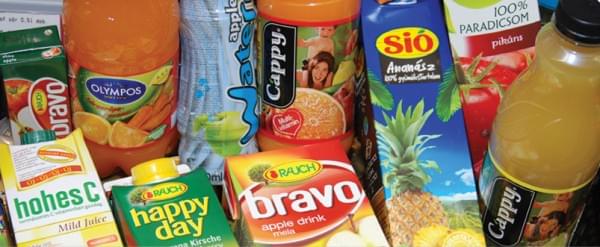PET bottle is still at the top of its game among fruit juices
– When the economic recession commenced, juices and premium category products were capable of strengthening their positions. By today this trend turned around and it is the low fruit content segment that is expanding – says Melinda Kun, product manager with Rauch Hungária Kft.
This trend induced changes in the domain of packaging materials too, as low fruit content products are typically sold in PET bottles. Éda Pogány, communications director of Coca-Cola Hungary told us that a few years back 90 percent of drinks were packaged in boxes but today PET bottles are the trendiest. Data from Nielsen for the February 2011-January 2012 period reveals that PET’s share from fruit juice volume sales exceeded 40 percent. The introduction of the public health product fee (NETA) entailed an increase in the price of fruit drinks with fruit content below 25 percent. Sió-Eckes Kft. reacted to this by doubling the fruit content of their Sió 12-percent ‘filtered’ products – we learned from Krisztina Gurály, trade marketing manager with Sió-Eckes Kft. Although they cost more, consumers get better quality and prices would have increased anyway. What about flavours? Well, there has been no big change – informs Anna Cholnoky, junior brand manager of Maspex Olympos Kft. Traditional flavours such as orange, peach, apple and multivitamin still dominate among juices sold in boxes. In the case of drinks in plastic bottle, mixed flavours are more frequent. Sió-Eckes’ innovation activity basically has two directions: they put new freshly pressed products on the market and they widen the range of exciting and refreshing flavours in their portfolio (in the summer season there is bigger demand for these than for high fruit content nectars and juices). The company builds strong brands in each segment – hohes C is still the number one choice for health-conscious consumers, while the SIÓ brand already crossed over to the territory of fruit purées and syrups. Under the SIÓ Vitatigris brand a new 0.33-litre, PET-bottle, sports-cap fruit drink product line for children appeared on the market last month. Sió-Eckes also decided to breathe new life into their Suzy brand using a new recipe and a new look; these products return with 12-percent fruit content in peach, apple and orange flavours. Sales of products in large size PET bottles are growing and SIÓ jumps on the bandwagon by launching their traditional flavours in this segment too. In 2011 Rauch Hungária is expanding Yippy product family – developed especially for children with calcium and vitamins – with two new flavours, apple and orange. Maspex Olympos recently launched Kubu Waterrr: it is made from crystal clear mountain spring water, to which a drop of fruit juice is added and only natural ingredients are used. Since February Kubu nectars have been available with a new portfolio and the 0.3-litre products are sold in a sports-cap version. A low carbohydrate intake is becoming more and more important in fruit juice consumption as well. This is the reason why the company launched Olympos Light drinks in 2011 – these are made without added sugar and are available in peach-apple, pineapple-citrus and sour cherry-apple-raspberry combinations. Coca-Cola Hungary is present in the low fruit content fruit drink segment with the Cappy Ice Fruit product line, from which forest fruits and multivitamin are the most popular versions. Under the Cappy brand they offer 100-percent fruit content and high fruit content products. The company would like to provide consumers with as much information (vitamin, fibre and fruit content; no preservatives and additives) about products as possible.
Related news
Related news
How Coca-Cola plans to build more billion-dollar brands
🎧 Hallgasd a cikket: Lejátszás Szünet Folytatás Leállítás Nyelv: Auto…
Read more >






